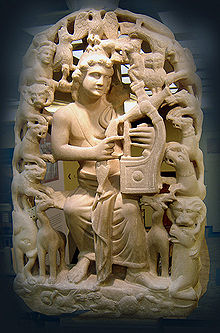Rembetiko
| Music of Greece | |
|---|---|
 |
|
| General topics | |
| Genres | |
| Specific forms | |
|
|
| Media and performance | |
| Music awards |
|
| Music charts | |
| Music festivals | |
| Music media |
|
| Nationalistic and patriotic songs | |
| National anthem | "Hymn to Liberty" |
| Regional music | |
| Related areas | Cyprus, Pontus, Constantinople, South Italy |
| Regional styles |
|
| Rebetiko | |
|---|---|
| Stylistic origins | Greek folk music, Byzantine music, Makams/Maqams |
| Cultural origins | late 19th century Greece and Asia Minor |
| Typical instruments | baglamas, tzouras, oud, kanonaki, santouri, lyra, violin, guitar, banjo, bouzouki, double bass, mandolin, accordion |
| Derivative forms | Smyrna style rebetiko, Laïko |
Rebetiko, plural rebetika (Greek: ρεμπέτικο, pronounced [reˈbetiko] and ρεμπέτικα respectively), occasionally transliterated as Rembetiko or Rebetico, is a term used today to designate originally disparate kinds of urban Greek music which have come to be grouped together since the so-called rebetika revival, which started in the 1960s and developed further from the early 1970s onwards. Rebetiko briefly can be described as the urban popular song of the Greeks, especially the poorest, from the late 19th century to the 1950s.
The word rebetiko or plural rebetika is an adjectival form derived from the Greek word rebetis (Greek: ρεμπέτης, pronounced [reˈbetis]). The word rebetis is today construed to mean a person who embodies aspects of character, dress, behavior, morals and ethics associated with a particular subculture. The word is closely related, but not identical in meaning, to the word mangas (Greek: μάγκας, pronounced [ˈma(ŋ)ɡas]), which means strong guy that "needs correction". The etymology of the word rebetis remains the subject of dispute and uncertainty; an early scholar of rebetiko, Elias Petropoulos, and the modern Greek lexicographer Giorgos Babiniotis, both offer various suggested derivations, but leave the question open. The earliest source of the word to date is to be found in a Greek-Latin dictionary published in Leyden, Holland in 1614 where the word ῥεμπιτός is defined as a wanderer, blind, misguided, etc.
Although nowadays treated as a single genre, rebetiko is, musically speaking, a synthesis of the music of the various areas of the Greek mainland and the Greek islands, Greek Orthodox ecclesiastical chant, often referred to as Byzantine music, and the modal traditions of Ottoman art music and café music.
...
Wikipedia
